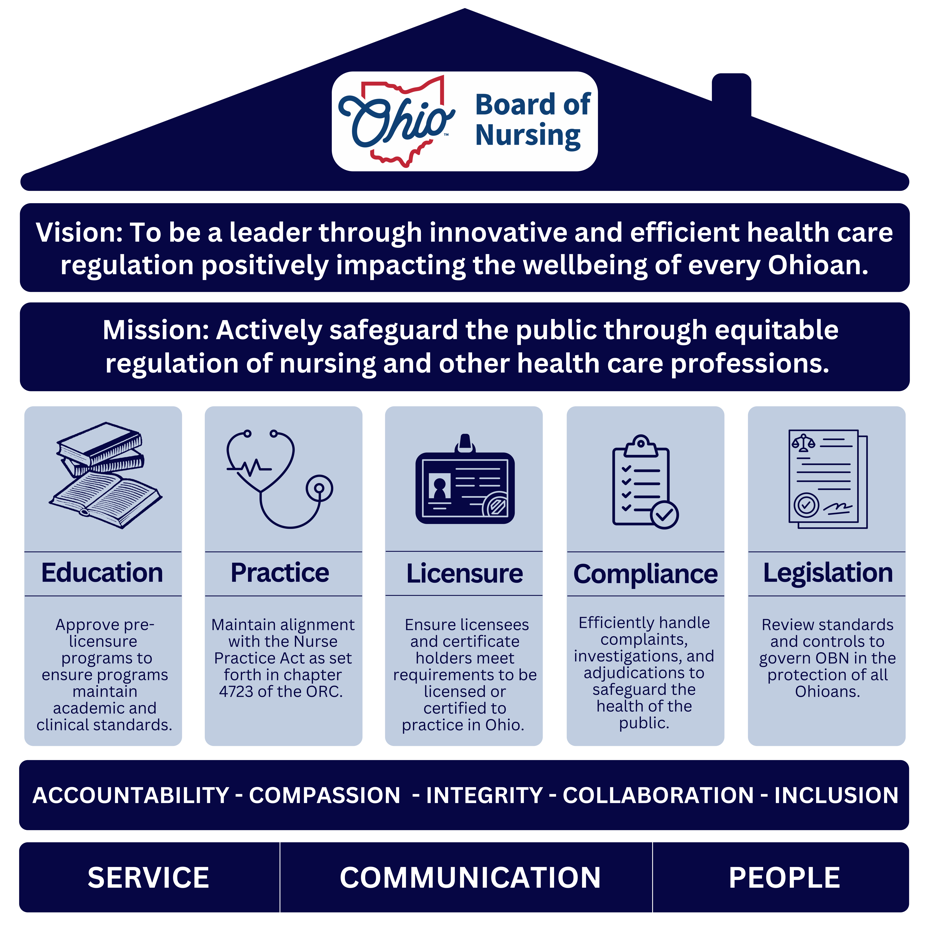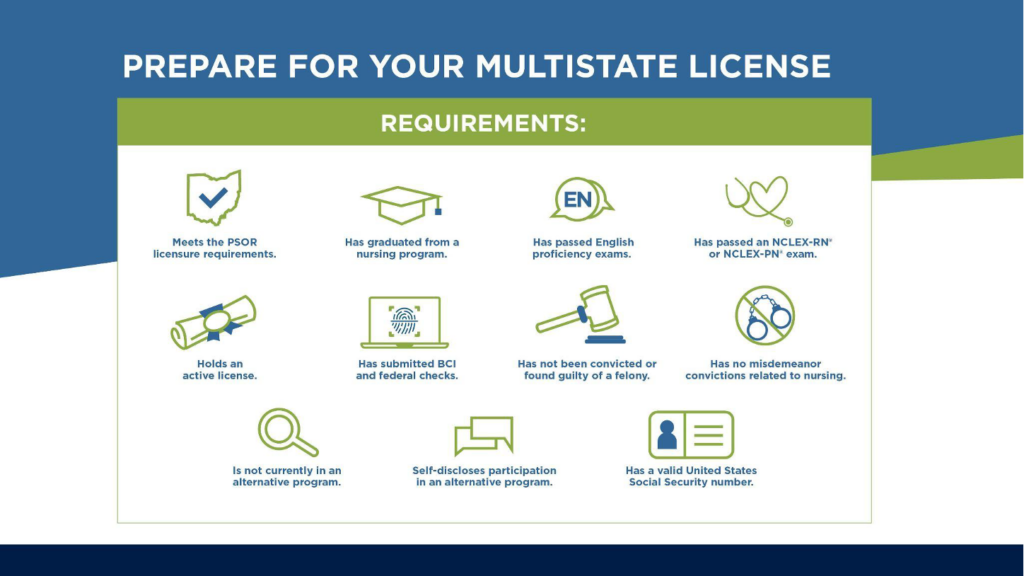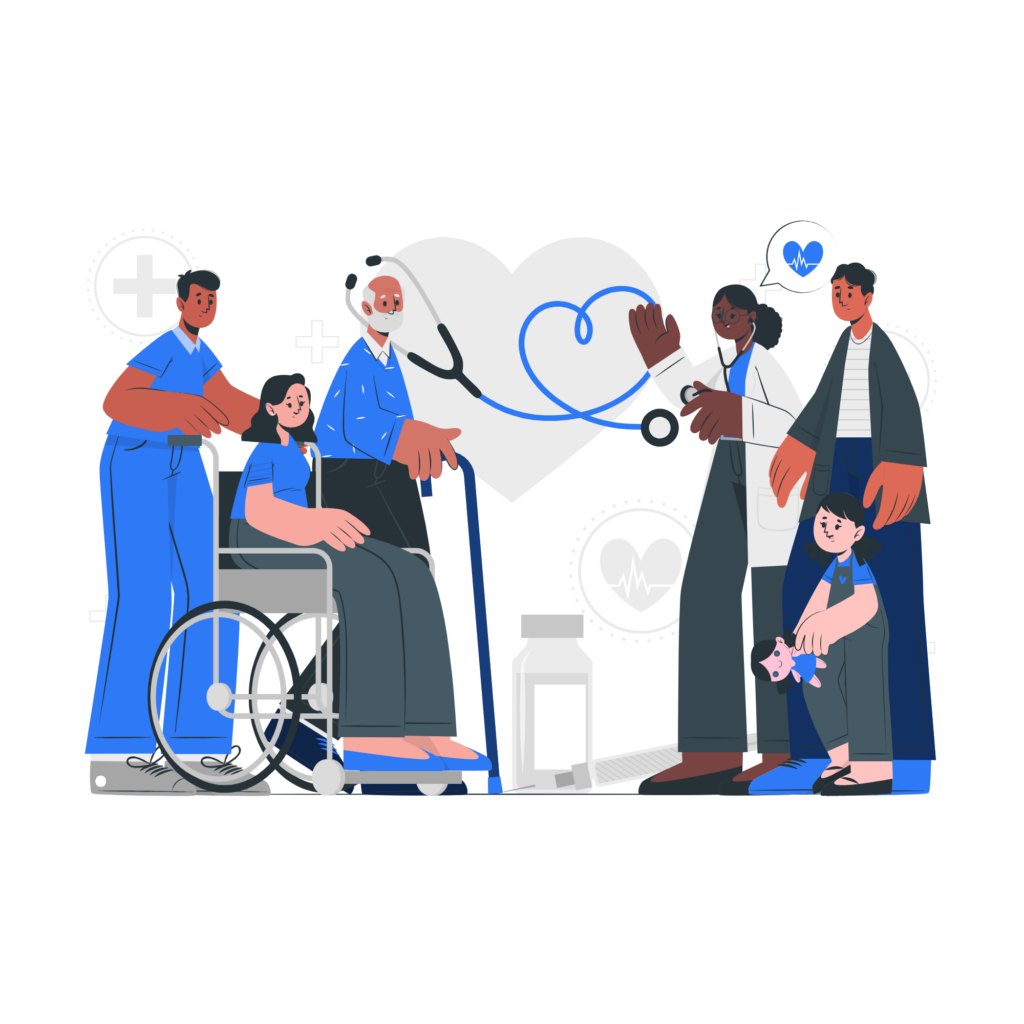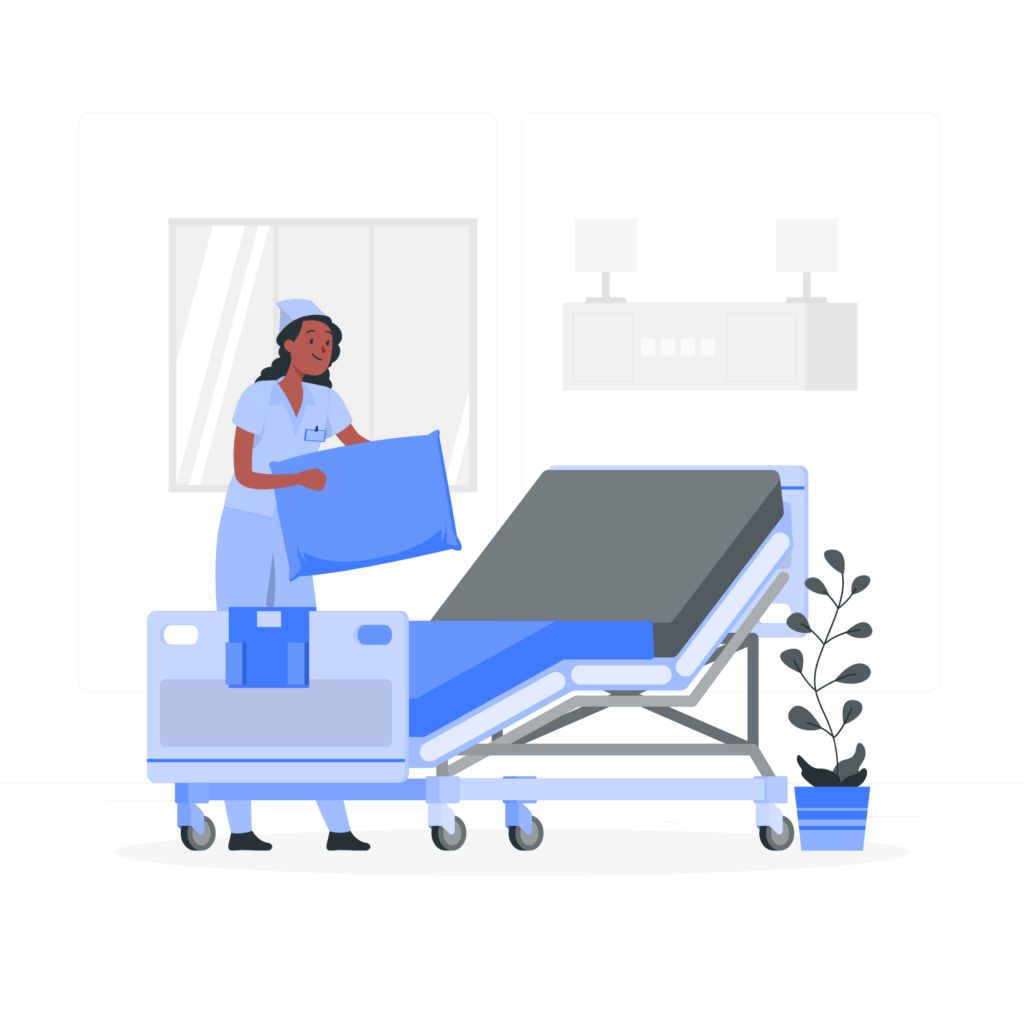The Ohio Board of Nursing is at the center of healthcare, dedicated to ensuring public safety. They keep watch, ensuring everyone from RNs and LPNs to APRNs, Dialysis Technicians, Community Health Workers, and Medication Aides upholds the highest standards.
In the 22 fiscal stretch, they’ve had their hands full overseeing 198 nursing programs that prep students for the field, along with 61 additional training crucibles. They even gave the green light to five shiny new nursing education initiatives. And just to give you a snapshot: in 2021, a whopping 212,645 RNs were confidently striding around with active licenses blessed by the board.
Let’s dive into the rules and regs that shape the Ohio Board of Nursing — from obtaining the license and staying sharp on the job to renewals and understanding how disciplinary actions are tackled.
Ohio Board of Nursing Overview
The Ohio Board of Nursing is led by a thirteen-member team appointed by the Governor, consisting of 8 registered nurses, 4 licensed practical nurses, and 1 consumer advocate – a public voice. Each member takes on a four-year duty with the option of returning for another term.
This team oversees a diverse group of professionals, including registered nurses, advanced practice registered nurses (nurse practitioners, clinical nurse specialists, midwives, and nurse anesthetists), as well as licensed practical nurses, dialysis technicians, certified medication aides, and community health workers.
Each meeting of the Board, its Advisory Groups, and Committees is open to the public, following Ohio’s Open Meetings Act.
The rules of Ohio’s Nurse Practice Act are found in Chapter 4723 of the Ohio Revised Code. The Board developed the related rules, chapters 4723-1 to 4723-27 of the Ohio Administrative Code, which outlines the requirements for license and certification, practice procedures, disciplinary proceedings, educational standards, and training program specifications.
The Board’s website is your go-to, brimming with verifications, rule proposals, reports, and a gateway to other state resources and the National Council of State Boards of Nursing. Then there’s Momentum, the Board’s quarterly dispatch that lands in the inboxes of those with active credentials, packed with updates on Board endeavors. And for the ever-curious, OBN e-News is just a subscription away, ready to dish out the freshest Board bulletins, at no cost.
Ohio Nursing Board Contact Information
| Ohio Board of Nursing Email | [email protected] |
| Ohio Board of Nursing Phone Number | 614-466-3947 |
| Ohio Board of Nursing Address | 17 S High St Ste 660, Columbus, OH 43215-3466 |
| Ohio Board of Nursing Portal | https://nursing.ohio.gov/ |

Ohio Board Nursing Practice Laws and Regulations
In Ohio, the very blueprint of nursing care rests within the pages of the Ohio Revised Code, where the standards and boundaries of nursing practice are drawn. It’s the Board’s solemn duty to uphold these principles, as laid out by the Ohio Nurse Practice Act’s Ohio Administrative Code. Every rule under their watchful eye undergoes a thorough review at minimum every half-decade. But their role stretches far beyond mere oversight. They’re the gatekeepers, granting the nod to nursing education programs, renewing nursing lifelines in the form of licenses, and keeping a watchful eye on the substance abuse monitoring program dedicated to those in the nursing field.
The Ohio Nurse Practice Act doesn’t just list off duties willy-nilly; it carves out a clear path of action, delineating exactly what tasks nurses, based on their level of licensure, are equipped and authorized to perform. This careful mapping ensures that every nurse operates at their peak, safeguarding patient safety without compromise.
Section 4723.04 of the ORC specifies that RNs must harness their extensive training and deep, nuanced understanding acquired from accredited schools to shepherd nursing care to those in need. Some of the tasks are:
- Identifying tendencies in human responses to current or anticipated health conditions that might be influenced by preventive, restorative, or health-promoting nursing routines.
- Delivering nursing regimens/interventions through the nursing process.
- Providing proper nursing care by assessing a patient’s health state using observation, interviews, and physical examination procedures.
- Giving patients health-related advice and education.
- Administering medications, therapies, and additional therapies as directed by a qualified and licensed professional.
They serve as educators, counselors, administrators of medicine, and guardians of nursing practice.
On the flip side, LPNs operate within a framework of collaboration, as outlined in Section 4723.4.04. Their world involves keen observation, precise assessments, and a commitment to patient education across various care settings. They’re deeply involved in the nursing care life cycle—from planning and implementing to the crucial evaluation stage. With the right credentials, they can administer medications and even pass down nursing tasks to those not holding a license, like CNAs.
Yet, LPNs steer clear of certain waters: venturing into nursing without RN or professional guidance is off-limits, as is giving IV push meds, teaching the ropes of nursing, overseeing the nursing practice, or undertaking comprehensive assessments.
Through these well-defined scopes of practice, Ohio ensures that its nurses are not just practicing—they’re thriving within the safe confines of the law, all while delivering top-tier care to their patients.
Board of Nursing Ohio Application Process and Eligibility Requirements
To secure RN certification in Ohio, candidates must complete an accredited nursing program. Following graduation, irrespective of program level, candidates are required to pass the state board examination to qualify for licensure. Before sitting for the exam, several prerequisites must be fulfilled:
- Candidates must satisfy both BCI and FBI fingerprint requirements as stipulated by the Ohio Board of Nursing (OBN).
This entails undergoing a background check and submitting a fingerprint card. It is critical that the Bureau of Criminal Identification and Investigation (BCI) performs these checks and reports the results immediately to the OBN. The particular “reason for fingerprinting” code varies depending on the agency doing the operation, however, the OBN recognizes ORC 4723.09 or ORC 4723.091.
- An application for “Nursing Licensure by Examination” must be completed and submitted via the state of Ohio eLicense portal.
Following these steps and the successful submission of official NCLEX-RN scores, licensure will be granted by the OBN.
For nurses seeking licensure by endorsement in Ohio, the process is as follows:
- Registration is required on the Ohio eLicense 3.0 System, which serves as the initial step in creating a professional profile.
- Completing the online RN application and paying the associated $75 fee are required.
- Verification of both the original nursing license obtained by examination and any current nursing licenses held must be provided.
- Submission of fingerprint cards for criminal background checks is required.
- Certified nursing school transcripts must be sent directly from the educational institution to the OBN.
- A requirement of 2 contact hours of Continuing Education (CE) on Ohio nursing practice must be met, with the Board’s website offering resources for approved courses and providers.
For those whose licenses are not recorded in the Nursys license portal, licensure verification must be requested through the portal, followed by the completion of an online endorsement application via the Ohio eLicense dashboard. Additionally, candidates for endorsement must complete 2 contact hours of continuing education in alignment with Category A requirements.
Ohio Nursing Board NCLEX Examination Requirements
To sit for the NCLEX-RN, candidates are required to undertake a series of procedural steps:
- An application for licensure by examination must be filed electronically via the Ohio Board of Nursing’s eLicense portal.
- A program completion letter from the candidate’s nursing program is necessary.
Graduates of nursing programs outside Ohio must provide an official transcript, which must be signed, sealed, and submitted to the board.
- Registration with Pearson VUE, the testing service, is mandatory.
- Candidates will then receive an Authorization to Test (ATT).
Please be advised that the ATT is good for 90 days. Failure to complete the assessment within this deadline will result in the payment of extra registration and exam fees.
- Candidates must schedule their examination at a convenient testing center.
A government-issued identity document, such as a driver’s license, military ID, or passport, is necessary for entry into the testing center.
Furthermore, candidates who completed their nursing school overseas must get a Credentials Evaluation Service Professional Report from the Commission on Graduates of Foreign Nursing Schools (CGFNS). The report in question must be provided to the board ahead of the planned testing day.

Ohio Board of Nursing Compact License
The Nurse Licensure Compact (NLC) was enacted by Ohio in January 2023, making it the 38th state to join the increasing list of compact states, with more states exploring NLC legislation.
Registered Nurses (RNs) and Licensed Practical Nurses (LPNs) in Ohio now have the choice of keeping their single-state nursing license or switching to a multistate license. This shift is completely optional. Switching to a multistate license costs $100 initially, followed by a $75 renewal charge.
To get a compact license in Ohio, candidates must meet the following standardized licensure prerequisites:
- Complying with all licensing regulations in their state.
- Completing a board-approved educational program or a comparable foreign program.
- Successful completion of the NCLEX-RN or NCLEX-PN Exam, or its precursor.
- Possession or eligibility for a valid, unencumbered license.
- Fingerprint-based criminal history checks are completed at both the state and federal levels.
- No misdemeanor convictions related to nursing practice.
- Possession of a valid United States Social Security number.
A compact license is exclusively issued in one’s primary state of residence. Once a multistate license is acquired, nurses are obliged to adhere to the Nurse Practice Act of any state they practice in. Non-compliance can lead to revocation of practicing privileges within that state. Furthermore, any disciplinary action taken by the state of practice is reported back to the nurse’s home state where the multistate license was issued.
The adoption of a compact license does not alter continuing education mandates. RNs and LPNs are still required to fulfill the continuing education requisites as prescribed by their home state.
It is crucial to remember that Advanced Practice Registered Nurses (APRNs) in Ohio have different licensure periods. Ohio is not included in the APRN Compact, hence an Ohio APRN license is only valid inside its borders as a single-state license.
Ohio State Board of Nursing License Renewal
Monitoring your Ohio nursing license renewal status is straightforward: visit the eLicense website and verify the expiration date. If you decide not to renew, you can request to place your license on inactive status with the Board by October 31.
Your license is officially renewed only upon receipt and processing of both your online application and payment. The critical deadline for renewal submissions and fee payments is October 31. Failing to renew by this date results in your license lapsing on November 1, necessitating a Reinstatement Application to resume nursing practice.
Early renewal is encouraged; there’s no late fee for renewals completed by September 15. For renewals between September 16 and October 31, a late processing fee will be charged. Should you miss the October 31 deadline, your license lapses the following day, and nursing practice must cease until reinstatement.
Note that additional information or documentation is only required during the online renewal process if you are prompted. Typically, this only applies to licensees who respond affirmatively to certain queries in the ‘additional information’ section.
OH Board of Nursing Continuing Education (CEU) Requirements
For those renewing their Ohio nursing license for the first time post-NCLEX, CE requirements are waived. Subsequent renewals require the completion of 24 contact hours of CE relevant to nursing practice within each licensure period. Nurses licensed by reciprocity for one year or less are obliged to complete 12 contact hours of CE.
RNs must ensure that their CE contact hours include at least one (1) contact hour of Category A, focused on Ohio nursing laws and rules, and sourced from an OBN Approver or an Ohio-headquartered OBN approved provider unit.
While proof of CE completion is not a prerequisite for nurses submitting reinstatement applications, it is prudent to maintain personal records of CE for a minimum of six years. This documentation is essential in the event of an audit or a request from the Board.

State of Ohio Board of Nursing Complaints and Disciplinary Actions
The Compliance Unit of the State of Ohio Board of Nursing rigorously processes and examines an excess of 7,000 complaints each year. These complaints range from criminal offenses, including drug theft and impaired practitioners, to breaches in standard practice, patient mistreatment, and other infractions of the Nurse Practice Act and its administrative regulations.
Breaching Ohio’s Nurse Practice Act may precipitate a range of disciplinary responses from the Board. These actions typically fall into several classifications: practice-related issues, substance misuse, boundary transgressions, sexual misconduct, patient abuse, deceitful acts, and positive findings on criminal background checks. Practice-related infringements include failures to recognize and act upon patient condition changes, execute necessary interventions, document nursing care accurately, or adhere to the quintessential “Five Rights” of medication administration.
Each complaint received by the Board is subjected to a preliminary assessment. The severity of the alleged violation dictates the extent of this review. The Board’s approach may encompass requesting additional documentation, conducting on-site inspections, or performing witness interviews. Often, the licensee in question is invited to provide a written response to the allegations.
Following the investigative phase, the Board of Nursing may choose from several courses of action: case dismissal, settlement discussions, alternative program offers, or the initiation of formal charges. In instances where there is compelling evidence that a nurse’s continued practice poses an immediate and grave threat to public safety, the Board is empowered to enact urgent measures such as license suspension.
The spectrum of disciplinary actions is subject to state legislation and may include monetary fines, civil penalties, referral to a disciplinary alternative program for supervised practice and recovery support, public admonishment or reprimand, tailored monitoring, educational interventions, practice limitations, license suspension, revocation, or voluntary surrender, as well as other state-specific sanctions.
Upon conclusion of the disciplinary proceedings, the Board may publicize the outcomes via state databases, newsletters, and official websites, and will report the actions to the Nursys database.
Nursing Board Ohio License Verification and Lookup
The State of Ohio Board of Nursing offers a simple and easy-to-use online tool for accurate and complete Ohio Board of Nurse License Verification. This License Look-Up function is a valuable resource for healthcare providers needing to check their license status, as well as employers and patients looking to authenticate a nurse’s qualifications in Ohio.
To initiate the Ohio Board of Nursing License Lookup process, users simply need to access the official website’s License Look-Up section. By entering the required details and clicking ‘Search’, the system promptly displays relevant licensing information at the bottom of the screen. For ease of access, direct links to individual or business records are provided, making it straightforward to obtain detailed licensure information.
Furthermore, nurses seeking to verify their licenses across state lines can utilize the Nursys verification process. This service, available for a nominal fee of $30 per license type, facilitates the Ohio Board of Nursing License Lookup across multiple states, offering a comprehensive solution for multi-state verification.
The Ohio Board of Nursing License Verification and Lookup tool is an invaluable asset for maintaining the integrity of the nursing profession in Ohio, ensuring that all practicing nurses meet the Board’s stringent standards for licensure.
FAQs about the Ohio State Board of Nursing
-
What is the Ohio Board of Nursing?
The Ohio Board of Nursing is a regulatory body that ensures the safe practice of nursing within the state. It oversees the licensure, education, and practice of nurses and nursing aides, setting standards to protect public health. -
How to find my nursing license number?
To find your nursing license number, you can perform an Ohio Board of Nursing license lookup. Visit the official website and access the license verification section. Here, you’ll find an easy-to-use tool for license verification Ohio Board of Nursing, where you can enter your name or other identifying information to locate your license details. -
How to get a compact nursing license in Ohio?
To obtain a compact nursing license in Ohio, ensure you meet the uniform licensure requirements, including holding an active, unencumbered license and having a clean criminal background check. Then, apply through the Ohio Board of Nursing’s eLicense system and choose the multistate license option. A one-time conversion fee may apply. -
What does in review mean on Ohio Board of Nursing?
In Review/Additional Information – an application is being reviewed, and extra information must be provided before the license may be awarded. In Review/Exam Eligible – the submitted application has been assessed and evaluated and the candidate is eligible to register for the relevant test. -
How to find an Ohio RN license number?
To find an Ohio RN license number, you’ll need to use the Ohio Board of Nursing login feature on their official website. Once logged in, you can access your profile and license information, including your RN license number. -
How do I lookup a nursing license in Ohio?
To lookup a nursing license in Ohio, utilize the Ohio Board of Nursing license verification tool available on their website. This feature allows you to search for and verify the status and authenticity of a nursing license within the state. -
How to contact the Ohio Board of Nursing?
The Ohio Board of Nursing can be contacted via email at [email protected], by phone at 614-466-3947, or by visiting their office at 17 S High St Ste 660, Columbus, OH 43215-3466. Their official portal, https://nursing.ohio.gov/, also provides additional contact details and resources. -
Do I need a license to volunteer my services?
In most cases, volunteering as a nurse in Ohio requires an active nursing license to ensure all services provided meet the state’s regulatory standards for safe practice. It’s best to check with the specific organization or the Ohio Board of Nursing for any exceptions. -
How long does it take to become a nurse in Ohio?
Becoming a nurse in Ohio typically involves completing a nursing program, which can take 2 to 4 years depending on whether you pursue an ADN or BSN degree. After graduation, you must pass the NCLEX-RN examination. The entire process from education to licensure can take from 2.5 to over 4 years, including study time and examination preparation.



